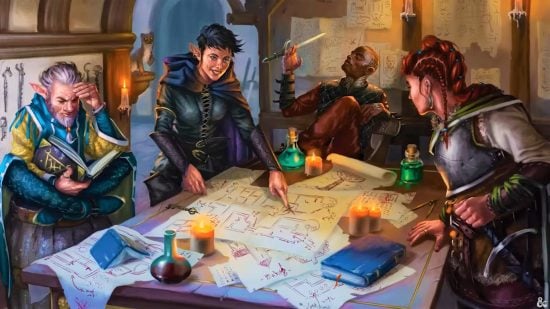In a second YouTube interview, D&D executive producer Kyle Brink says Wizards of the Coast “should have had more creators at the table” when discussing changes to the DnD OGL. Speaking to Teos Abadía (Mastering Dungeons) on February 8, Brink explains, “I did as much as I could to both represent the DnD studio at the table in those conversations and shield the creators from being distracted by those conversations”.
“I think I put up too strong a wall, though”, he adds, “and we should have had more creators at the table”. “I think that would have beneficially helped the entire conversation around the OGL.”
Proposed changes to the D&D Open Gaming Licence were leaked in January. After public outcry, mainstream news coverage, and attempts to redraft the leaked version of the OGL 1.1 document, Wizards of the Coast eventually cancelled plans to overhaul OGL 1.0. It instead released the tabletop RPG’s System Reference Document under a Creative Commons licence. This makes a range of rules, including some DnD classes and DnD races, more widely available for third-party use.
Based on Brink’s interview, it seems there was little to no input from the in-house D&D design team (other than Brink himself) when discussing changes to the OGL. Brink tells Abadía he didn’t involve his team “in the interest of serving the team”. “I wanted to give them the room to run, part of that is also screening them from stuff that would be distracting or disrupting”, he says. “Long discussions over a legal document is a great way to suck up a designer’s time and prevent them from finishing their work.”
“But as a result of that, I am absolutely certain there are people on my team who were surprised by what they saw”, Brink adds. “Certainly when they were given the opportunity to weigh in, as we did have people internally review and give feedback on the OGL as it was developing, their feedback was pretty clear, and they felt the same way many creators did.”
“I think this is why more studio involvement earlier would have prevented a lot of this, and that’s what’s gonna be happening going forward”, Brink says.
In his interview with the Three Black Halflings podcast on February 6, Brink paints a similar picture of what this change may look like. “We’re giving much more of a voice to folks on my team, myself included, who are closer to the community and who will be able to catch this kind of team and have the volume to prevent it”, he says.
“Should we in future be looking at corporate strategies or company strategies that would impact the D&D community, now folks like me and leaders of my creative team are in the conversation”, Brink adds. He also tells Three Black Halflings Wizards of the Coast will have “greater respect” for the core D&D team when considering how corporate decisions impact the game’s community.
In the same interview, Brink says the D&DBeyond boycotts weren’t responsible for walking back the OGL changes. He also says “you shouldn’t need to trust Wizards of the Coast to play Dungeons and Dragons”.
